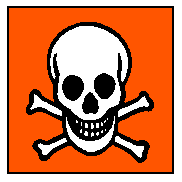International Chemical Safety Cards
| 3-CHLOROANILINE | ICSC: 0130 |
| 3-CHLOROANILINE 1-Amino-3-chlorobenzene 3-Chlorobenzeneamine Orange GC base (C6H4)Cl(NH2) Molecular mass: 127.6 CAS # 108-42-9 RTECS # BX0350000 ICSC # 0130 UN # 2019 EC # 612-010-00-8 |
 |
| TYPES OF HAZARD/ EXPOSURE |
ACUTE HAZARDS/ SYMPTOMS |
PREVENTION | FIRST AID/ FIRE FIGHTING |
| FIRE | Combustible. Gives off
irritating or toxic fumes (or gases) in a fire. |
|
Powder, AFFF, foam, carbon
dioxide. |
| EXPLOSION | |
|
|
| EXPOSURE | |
|
|
| INHALATION | Blue lips or finger nails.
Blue skin. Dizziness. Drowsiness. Headache. Nausea. Shortness of breath. Unconsciousness. |
Ventilation, local exhaust,
or breathing protection. |
Fresh air, rest.
Half-upright position. Artificial respiration if indicated. Refer for medical attention. |
| SKIN | MAY BE ABSORBED! Redness.
Burning sensation (further see Inhalation). |
Protective gloves.
Protective clothing. |
Remove contaminated
clothes. Rinse and then wash skin with water and soap. Refer for medical attention. |
| EYES | Redness. Pain. Severe deep
burns. |
Safety goggles or face
shield. |
First rinse with plenty of
water for several minutes (remove contact lenses if easily possible), then take to a
doctor. |
| INGESTION | Abdominal pain. Nausea
(further see Inhalation). |
Do not eat, drink, or smoke
during work. |
Rinse mouth. Induce
vomiting (ONLY IN CONSCIOUS PERSONS!). Give plenty of water to drink. Refer for medical
attention. |
| SPILLAGE DISPOSAL | STORAGE | PACKAGING & LABELLING | ||
| Collect leaking and spilled
liquid in sealable containers as far as possible. Absorb remaining liquid in sand or inert
absorbent and remove to safe place. Do NOT wash away into sewer (extra personal
protection: A/P2 filter respirator for organic vapour and harmful dust). |
Separated from food and
feedstuffs. Keep in the dark. Well closed. |
Do not transport with food
and feedstuffs. T symbol R: 23/24/25-33 S: 28-36/37-44 UN Haz Class: 6.1 UN Pack Group: II |
||
| SEE IMPORTANT INFORMATION ON BACK | ||||
|
||||